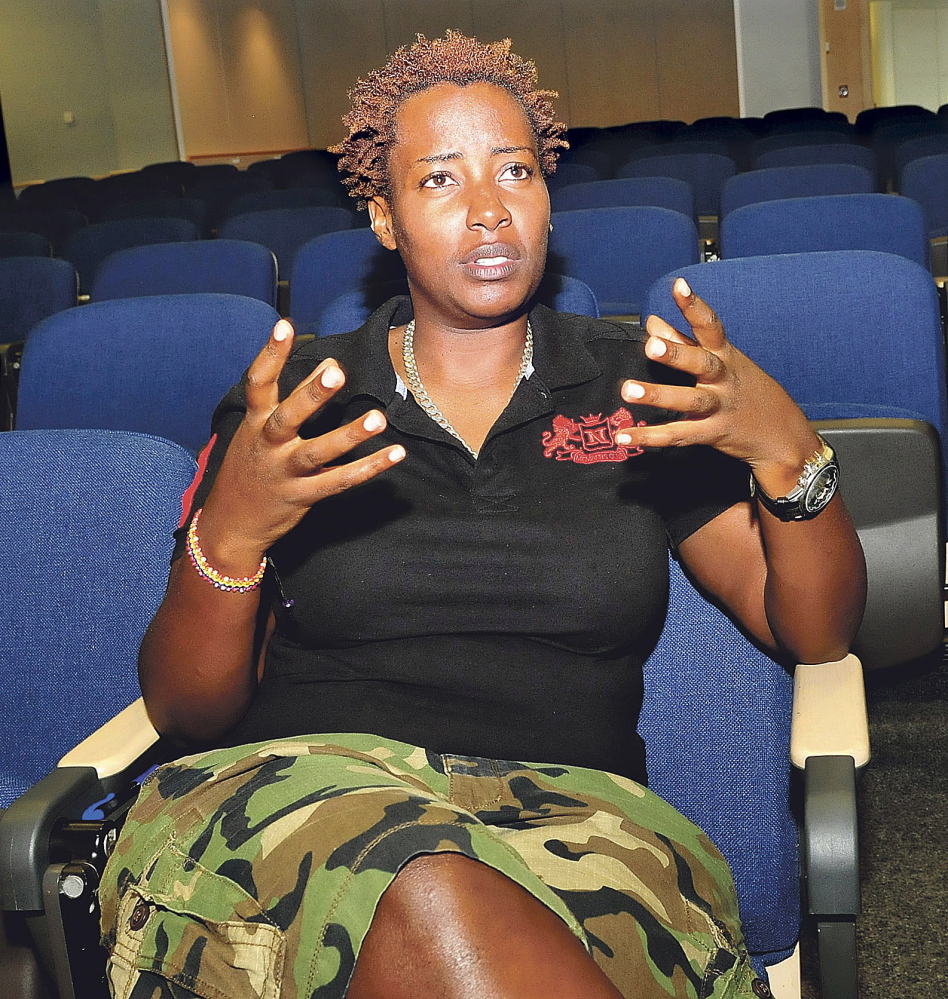While living in Uganda, Clare Byarugaba can’t drive alone, walk in the street or live at any home for more than three months.
Byarugaba faces constant danger as an outed lesbian advocating for gay rights in a country that has seen increasing homophobia since its government proposed a law in 2009 making same-sex relations punishable by death.
That anti-gay law, passed at the end of 2013 without the death penalty provision, was overturned by a Ugandan court on a technicality in August. But Byarugaba said the decision hasn’t changed the country’s homophobic culture, and she’s concerned a similar law could be proposed again.
Byarugaba, a 2014 Oak Human Rights Fellow at Colby College in Waterville, is one of about 16 presenters at a free conference Oct. 8-10 at Colby and the University of Maine at Augusta about stories of human rights violations from womens’ perspectives.
The conference is being sponsored by the two schools and the Holocaust and Human Rights Center of Maine at UMA, along with several departments within the schools.
Byarugaba said homophobia has flourished in the eastern African country because religious leaders and politicians are the ones spreading the message.
The two common underlying myths are that gay people want to recruit children and that their agenda is to stop traditional marriage and wipe out humanity, she said.
She said leaders tell people “if homosexual is accepted in Uganda, it means Uganda will be wiped out. These kind of ideologies that spread back home are very dangerous.”
Byarugaba, 27, is advocating for gay rights with the Civil Society Coalition on Human Rights and Constitutional Law, a group established in 2009 in response to the Ugandan Parliament’s anti-gay bill. She and other members of the coalition received the State Department’s 2011 Human Rights Defenders Award for their work in Uganda.
Byarugaba’s presentation at 10:50 a.m. Oct. 10 at Colby will address the problem of homophobia in Uganda, the effect of the anti-gay law on lesbians and others, and how conditions compare to genocides elsewhere in the world, such as the Rwandan genocide in 1994. She said the homophobia in her home country should be seen as an early warning sign of genocide.
“I’ve had cases where religious leaders say LGBT (lesbian, gay, bisexual and transgender) people, like the whole community, should be taken on an island and left to die. It’s like they’re planting seeds, not just of homophobia, but they’re saying we need to wipe homosexuality out of Uganda. That to me is a deeper issue than just homophobia,” Byarugaba said.
The conference came about from discussions between UMA and Colby professors who organized a panel for a conference about the Holocaust in Israel last year.
Robert Katz, a professor of art at UMA, said they wanted to recreate the panel in Maine, but broaden it to include other acts of war, genocide and human rights violations. He said the goal is to explore the issue of humans rights from a gendered perspective, from women’s testimony.
“If we look at history, more often than not, it’s men that create the wars, men that fight the wars; and often it’s the women that suffer the most,” Katz said.
Katz will present his 80-minute multimedia installation called “Were the House Still Standing” in a public screening at 7 p.m. Oct. 8 at UMA’s Michael Klahr Center. It shows oral testimonies of Holocaust survivors and liberators living in Maine and is a permanent installation in the Holocaust and Human Rights Center of Maine.
The second day of the conference, Oct. 9, also will be held at UMA’s Michael Klahr Center and will include a presentation from Audrey Brunetaux, an assistant professor of French at Colby, in the panel about the Holocaust installation.
Brunetaux said the conference will include scholars, artists and activists from all over the world covering a variety of topics – from the Holocaust to the more contemporary stories of human trafficking, and revolution and women’s rights in the Middle East.
Send questions/comments to the editors.


